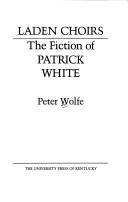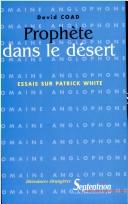| Listing 1 - 10 of 21 | << page >> |
Sort by
|
Book
ISBN: 1783083999 1783084456 1783083972 Year: 2015 Publisher: London : Anthem Press,
Abstract | Keywords | Export | Availability | Bookmark
 Loading...
Loading...Choose an application
- Reference Manager
- EndNote
- RefWorks (Direct export to RefWorks)
Patrick White (1912-1990) won the Nobel Prize for Literature in 1973 and remains one of Australia's most celebrated writers. In 2006, White's literary executor, Barbara Mobbs, released a highly significant collection of hitherto unpublished papers, reviving mainstream and scholarly interest in his work. 'Patrick White Beyond the Grave' considers White's writing in light of the new findings, acknowledging his homosexuality in relation to the development of his literary style, examining the way he engages his readers, and contextualizing his life and oeuvre in relation to London and to London life. Thought-provoking, this collection of original essays represents the work of an outstanding list of White scholars from around the globe, and will no doubt inspire further work on White from a rising generation of scholars of twentieth-century literature beyond Australia.
White, Patrick, --- White, Patrick Victor Martindale --- Criticism and interpretation. --- וייט, פטריק, --- Уайт, Патрик, --- Uaĭt, Patrik, --- ホワイト, パトリック, --- Howaito, Patorikku,
Book
ISBN: 0236400428 Year: 1976 Publisher: London
Abstract | Keywords | Export | Availability | Bookmark
 Loading...
Loading...Choose an application
- Reference Manager
- EndNote
- RefWorks (Direct export to RefWorks)
White, Patrick --- -וייט, פטריק. אריוך, ג. --- Philosophy --- White, Patrick, --- Philosophy. --- -Philosophy --- וייט, פטריק, --- Уайт, Патрик, --- Uaĭt, Patrik, --- ホワイト, パトリック, --- Howaito, Patorikku, --- White, Patrick Victor Martindale

ISBN: 0813115019 Year: 1933 Publisher: Lexington, KY : University Press of Kentucky,
Abstract | Keywords | Export | Availability | Bookmark
 Loading...
Loading...Choose an application
- Reference Manager
- EndNote
- RefWorks (Direct export to RefWorks)
White, Patrick, --- White, Patrick Victor Martindale --- Criticism and interpretation. --- Australia --- In literature. --- White, Patrick --- וייט, פטריק, --- Уайт, Патрик, --- Uaĭt, Patrik, --- ホワイト, パトリック, --- Howaito, Patorikku,
Book
ISBN: 0773593470 9780773593473 9780773501126 Year: 1972 Publisher: Montreal [Québec] Beaconsfield, Quebec
Abstract | Keywords | Export | Availability | Bookmark
 Loading...
Loading...Choose an application
- Reference Manager
- EndNote
- RefWorks (Direct export to RefWorks)
Fiction --- Fiction writing --- Metafiction --- Writing, Fiction --- Authorship --- Technique. --- White, Patrick, --- White, Patrick Victor Martindale --- Criticism and interpretation. --- וייט, פטריק, --- Уайт, Патрик, --- Uaĭt, Patrik, --- ホワイト, パトリック, --- Howaito, Patorikku,
Book
ISBN: 0813165067 9780813165066 0813155495 9780813155494 Year: 1983 Publisher: Lexington, Ky.
Abstract | Keywords | Export | Availability | Bookmark
 Loading...
Loading...Choose an application
- Reference Manager
- EndNote
- RefWorks (Direct export to RefWorks)
In 1973 the Australian novelist Patrick White won the Nobel Prize for Literature, the year that his great novel of family ties and change, The Eye of the Storm, was published and became a bestseller in America and Europe. Yet White is still not widely known or read, and few writers of today have provoked so many contradictory judgments.Now Peter Wolfe has written the first book-length study of the work of this brilliant and haunting novelist. The study offers a subtle, penetrating examination of White's style, his skill in building narrative tension, and also the depth and complexity reflecte
White, Patrick, --- White, Patrick Victor Martindale --- Criticism and interpretation. --- Australia --- In literature. --- וייט, פטריק, --- Уайт, Патрик, --- Uaĭt, Patrik, --- ホワイト, パトリック, --- Howaito, Patorikku,
Book
ISBN: 9781443893374 1443893374 1443817503 9781443817509 Year: 2017 Publisher: Newcastle upon Tyne
Abstract | Keywords | Export | Availability | Bookmark
 Loading...
Loading...Choose an application
- Reference Manager
- EndNote
- RefWorks (Direct export to RefWorks)
The novels of Australia's Nobel Laureate Patrick White (1912-1990) are a persistent commentary on Nietzsche's proclamation of God's death. As White knew the proclamation was not about God's existence, but about classical views of God, it presented him with the impossible task of using language to describe what language cannot describe. This has always been one of the more misunderstood aspects of his literary vision. Because the announcement is often interpreted in antithetical ways, atheistic, theistic, secular, religious, humanistic and fatalistic, critics should gain a better understanding of what White was trying to achieve by comparing him with his post-war contemporaries from England, Scotland, and Canada: Iris Murdoch, William Golding, Muriel Spark and Robertson Davies. After, and because of, the war, these authors all commented on the consequences of God's death. Along with White, they worked with a shared pattern of tropes to explore the light and dark aspects of western consciousness and the civilization it has produced. Where did the pattern come from? Was it metaphysical or metapsychological? These questions are complex as the pattern came from many sources, simultaneously and synergistically, but this book tackles these questions by describing that pattern.
God in literature. --- White, Patrick, --- White, Patrick Victor Martindale --- Criticism and interpretation. --- וייט, פטריק, --- Уайт, Патрик, --- Uaĭt, Patrik, --- ホワイト, パトリック, --- Howaito, Patorikku,

ISBN: 2859395334 9782859395339 Year: 1997 Volume: *1 Publisher: Villeneuve d'Ascq: Presses universitaires du Septentrion,
Abstract | Keywords | Export | Availability | Bookmark
 Loading...
Loading...Choose an application
- Reference Manager
- EndNote
- RefWorks (Direct export to RefWorks)
White, Patrick
---
Criticism and interpretation
---
#BIBC:ruil
Book
ISBN: 022402924X 9780224029247 Year: 1981 Publisher: London: Cape,
Abstract | Keywords | Export | Availability | Bookmark
 Loading...
Loading...Choose an application
- Reference Manager
- EndNote
- RefWorks (Direct export to RefWorks)
White, Patrick --- Novelists, Australian --- -Australian novelists --- וייט, פטריק. אריוך, ג. --- Biography --- White, Patrick, --- וייט, פטריק, --- Уайт, Патрик, --- Uaĭt, Patrik, --- ホワイト, パトリック, --- Howaito, Patorikku, --- Novelists [Australian ] --- 20th century --- White, Patrick Victor Martindale --- Novelists, Australian - 20th century - Biography
Book
ISBN: 9401206724 1441603557 9781441603555 9042025166 9789042025165 9042025166 9789042025165 Year: 2009 Publisher: Amsterdam [Netherlands] ; New York : Rodopi,
Abstract | Keywords | Export | Availability | Bookmark
 Loading...
Loading...Choose an application
- Reference Manager
- EndNote
- RefWorks (Direct export to RefWorks)
The time for new approaches to White’s work is overdue. Central to the present study are Edward Said’s ideas about the role of the intellectual (and the writer) – of speaking “truth to power,” and also the importance of tracing the “affiliations” of a text and its embeddedness in the world. This approach is not incompatible with Jung’s theory of the ‘great’ artist and his capacity to answer the deep-seated psychic needs of his people. White’s work has contributed in many different ways to the writing of the nation. The spiritual needs of a young nation such as Australia must also comprehend its continual urge towards self-definition. Explored here is one important aspect of that challenge: white Australia’s dealings with the indigenous people of the land, tracing the significance of the Aboriginal presence in three texts selected from the oeuvre of Patrick White: Voss (1957), Riders in the Chariot (1961), and A Fringe of Leaves (1976). Each of these texts interrogates European culture’s denigration of the non-European Other as embedded in the discourse of orientalism. One central merit of White’s commanding perspective is the constant close attention he pays to European hubris and to the paramount autonomy of indigenous culture. There is evidence even of a project which can be articulated as a search for the possibility of white indigeneity, the potential for the white settler’s belonging within the land as does the indigene.
Australian literature --- Aboriginal Australians in literature. --- Australian aborigines in literature --- History and criticism. --- White, Patrick, --- White, Patrick Victor Martindale --- Criticism and interpretation. --- Postcolonialism in literature. --- וייט, פטריק, --- Уайт, Патрик, --- Uaĭt, Patrik, --- ホワイト, パトリック, --- Howaito, Patorikku,
Book
ISBN: 1443866156 9781443866156 1322097259 9781322097251 1443860409 9781443860406 Year: 2014 Publisher: Newcastle upon Tyne : Cambridge Scholars Publishing,
Abstract | Keywords | Export | Availability | Bookmark
 Loading...
Loading...Choose an application
- Reference Manager
- EndNote
- RefWorks (Direct export to RefWorks)
This volume marks the birth centenary of a giant amongst contemporary writers: the Australian Nobel prize-winning novelist, Patrick White (1912-1990). It proffers an invaluable insight into the current state of White studies through commentaries drawn from an international galaxy of eminent critics, as well as from newer talents. The book proves that interest in White's work continues to grow and diversify. Every essay offers a new insight: some are re-evaluations by seasoned critics who rev...
White, Patrick, --- White, Patrick Victor Martindale --- Influence. --- Criticism and interpretation. --- Critique et interprétation --- וייט, פטריק, --- Уайт, Патрик, --- Uaĭt, Patrik, --- ホワイト, パトリック, --- Howaito, Patorikku, --- WHITE, PATRICK, 1912-1990 --- AUSTRALIAN FICTION --- LITERARY CRITICISM
| Listing 1 - 10 of 21 | << page >> |
Sort by
|

 Search
Search Feedback
Feedback About UniCat
About UniCat  Help
Help News
News